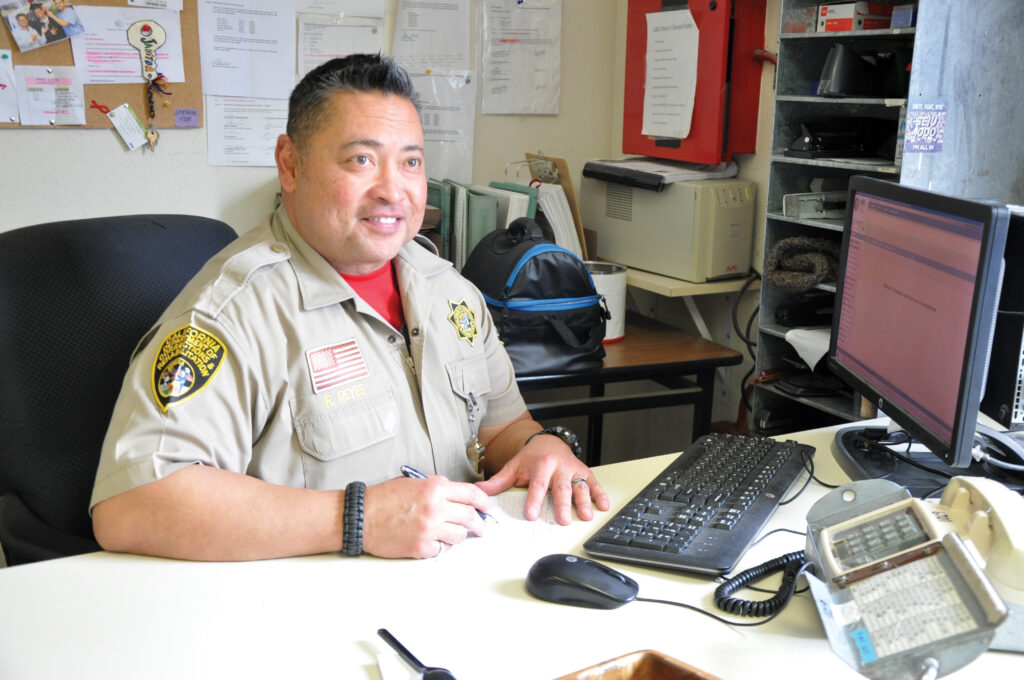
San Quentin Education Officer R. Reyes retired from CDCR in November after 23 years of service.
“Officer Reyes was a true advocate for students getting their education,” said Principal Michael Wheeless. “And he always had a smile on his face.”
Sitting at the front desk in main education for the last ten years, Reyes was the first person everyone saw on their way in to school and the last person on the way out, Wheeless explained.
“Officer Reyes said ‘Good morning’ to us every day as we came in to school,” said student Benito Muro, remembering when Reyes first started working at the education post in 2013. “After he got to know us, he began greeting us by name.”
“Not all officers are so respectful,” said Martín Gómez, another student who has known Reyes for ten years. “Reyes treated everyone fairly and supported our education. His understanding helped create a positive learning environment for all of us.”
Muro and Gómez both said that Reyes spoke enough Spanish so that Hispanics — and all races — were confident communicating with him through their daily school issues.
The education desk is the hectic hub for adult school, college, and self-help groups every day from 7 a.m. to 8 p.m. People get stressed about difficult exams, rigorous course requirements, misplaced IDcards, difficulty finding the right classroom, long alarms without access to a bathroom. Reyes was always there to keep things from getting out of hand.
Reyes said that interacting daily with the diverse and dynamic attitudes, personalities, and backgrounds of the hundreds of students, educators, volunteers, and officers was both challenging and rewarding.
“I was surprised at how much I learned from the guys, just by listening,” said Reyes.
“I learned that effective communication is the key, because understanding each other leads to successful outcomes. We all just want to have a good day and get home safely.”
Before his education post, Reyes worked on Death Row. Officer M. Perez also worked there, in East Block, for 14 years, including a few years with Reyes.
“Reyes was a good solid officer. He handled his business, as we all did,” said Perez. “Officers earn the respect of the inmates in East Block too, because if we don’t, things can get violent.”
“The officers respected Reyes, too. We were ready to help anybody, anytime. We’re like family,” said Perez. “Reyes ran his program and didn’t go outside the box. He was good to talk with.”
Before becoming a correctional officer, Reyes served four years in the Marine Corps, including combat duty in Desert Storm.
“Reyes ate well, too,” said the students, recalling how good his meals smelled at lunchtime.
“My complaint about Officer Reyes,” Gómez said, “is that he never gave me even a single piece of chicken,” laughing afterward.
Reyes earned the students’ respect by valuing them as people while still maintaining the boundaries of their relationship.
Reyes saw The Q change over the 23 years he served here. “There’s more room for de-escalation now than there was back in the 2000s,” he said.
He said that the increasing emphasis on rehabilitation in staff training and in the working environment at San Quentin has changed the perspectives of many of the continuing and new staff.
What tips for success does Officer Reyes have for new correctional officers beginning their careers now? “Be respectful, patient, firm, fair, consistent, and — above all — communicate,” he said.
It worked for Reyes. Through 23 years as a correctional officer at San Quentin, he had a positive impact on coworkers, volunteers, and prison residents alike.
“Reyes deserves the very best retirement possible. His support made a difference in my educational experience,” said Muro, who completed his GED in September.